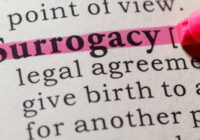We tend to assume that a child needs a certain amount of care and that this care may more or less be provided by anyone. In “traditional” cultures, this role happens to be played by mothers—perhaps because the patriarchy subordinates them and exploits their labor; perhaps just because, since they carried and nursed the child in its infancy, when the child is grown, the mother continues to be stuck with it out of inertia. However, the truth is that childcare is not so fungible. It is deeply rooted in human psychological nature for a child to need the attention and care of its mother. There is no substitute for Mama.
When a woman becomes a mother, she accepts complex and multidimensional obligations within the household and when parenting a child. University of Washington professor Jennifer Romich recognized that the commitments and responsibilities regarding a maternal figure adhering to a domestic setting include diverse as well as range far beyond basic childbearing. To give just a few examples, mothers give their children psychological support and empathy, teach them moral values, and mediate how they interact with their siblings and their fathers.
Let’s see what the literature has to say about how a mother’s protective characteristics, psychological assistance, and intellectual guidance uniquely impact and shape a child’s development into a healthy adult.
Physical and psychological care
Psychologist John Bowlby observed that mothers hold the responsibility for providing their children with anything that is necessary to be able to survive biologically, especially nutrition, clothing, a place to live, and professional medical care. They contribute to ensuring, with certainty that the children remain in good health and safe.
However, physical assistance is not all, or even most, of what a mother does for her children. Bowlby emphasized that the key component of a mother’s activity within her own home involves her nurturing character. Moms offer their young ones an unparalleled, unique kind of support, commencing the day their babies are born. The tie between a mother and child emerges fast and endures throughout the child’s development, from the pivotal early stages to later maturation when the child learns how to interact with others from a foundation of self-worth and psychological wellbeing.
Karen Swift stressed in a 2015 journal article that a mom generally inspires the role of being the sentimental anchor throughout the life of her family. Her ability to fully understand, empathize, and impart relief is vital for establishing balance in the family. A mom contributes an attentive ear, a soothing existence, and encouraging counsel whenever loved ones suffer from challenges. She is a source of psychological strength during disasters, teaching children how to manage strong emotions and get through difficult times. This can involve a conversation about the problems children are having difficulties with, offering direction, or offering help to them.
Values and educational guidance
Sociologist Thurston Domina found that parents have the indispensable role of teaching their children about everything that’s happening around them, from basic concepts such as how to properly nourish themselves and clothing to more advanced concepts that include the difference between good and evil. Furthermore, mothers assist their children’s developmental milestones in social and emotional areas. The mother performs an essential function in teaching her offspring. Mama educates young ones with morals and principles, along with daily experiences that have shaped their personalities, in addition to providing them with a formal education. She transmits her cultural heritage, tradition, and civic principles to their young offspring, enabling their kids to establish an awareness of themselves and their surroundings.
She fulfills the role of the child’s primary trainer, imparting knowledge to children about the spoken tongue, their society, and the basic principles of existence. Her way of educating often maintains an influence on a student’s mindset with regard to education, inquisitiveness, and the pursuit of knowledge throughout life.
The Handbook of Parenting, Volume I, edited by psychologist Marc Bornstein, illustrates how, even as a child matures, the mother’s influence on the child’s development does not diminish. These early beliefs, principles, and experiences in life that have been formed remain impactful on a child’s choices, relationships, and ambitions. An individual’s ability to trust or to express emotion can be greatly impacted by a mother’s steady encouragement and conviction in her child’s capability, or lack thereof.
The crucial function of a mother in equipping her child to face the obstacles of adulthood is impossible to understate. In order to do this, a mom must be able to establish a safe haven, enable candid debate, provide counsel on how to tackle controversial decisions, and maintain an authoritative voice on moral matters.
Fostering family relationships
Moms play a key role in forging bonds all across the nuclear extended family. Mothers shape the way their children develop connections with their fathers, their siblings, their cousins, and other blood relatives.
Managing a household is much more than doing chores. Mothers schedule functions and events involving the entire family. Becoming a mother is an incredibly demanding occupation; a mother not only mediates how members of her family interact with one another but also how her family interacts with the outside world.
The impact of culture and society
York University professor Karen Swift underlines how the perspective and perceptions of a mom’s place within the home can vary across distinct cultures. While mothers across cultures will always have a relationship of care for their children, there is no one-size-fits-all pattern for the role that a woman plays in the family. Instead, a mother’s role will naturally vary according to societal rules, regulations, and customs. It is important to understand and embrace this diversity rather than simply insisting that “a woman’s place is in the home” and condemning women who work, or, conversely, insisting that women work outside the home and devaluing the vocation of women who make their place within the household. It is incredibly crucial that we recognize and cherish the wide range of circumstances and obstacles that women navigate in different parts of the world and the strength and creativity that they demonstrate as they do so.
The transformation of societies that modern economies have created for women in recent times has, in many ways, rendered raising children in the family home more challenging. Many mothers juggle their full-time jobs, household responsibilities, and infant care while striving to maintain an appropriate equilibrium. It is essential that, in balance, they prioritize caring for themselves and not forget that they, too, are persons who need nurture, recreation, and rest. Romich recommends that women can practice self-care by enjoying entertainment, learning meditation, or receiving assistance from their loved ones. Then, they can care for their families with newly minted vitality and enthusiasm.
Some advice for mothers
Life, quite simply, could not go on without the contributions of women and mothers. To help women who desire to do everything that’s feasible regarding the children they love, we can glean the following recommendations from the Handbook of Parenting, Volume I:
- Remaining available: This is one of the most important and essential tasks that a mom can perform for her young ones. This means engaging in activities with her children throughout the day as well as remaining physically and psychologically accessible to them.
- Taking concern while uplifting: Moms ought to constantly motivate as well as love their kids, regardless of how they offend. Youngsters will gain more from experiencing being secure and loved than from harsh punishments. With time, they will discover ways to be affectionate and support everyone as a consequence.
- Setting an outstanding example: Mothers generally are the primary positive role models with their young children; consequently, it’s of the utmost importance to demonstrate leadership via illustration. Mothers should behave as they expect their children to behave, imparting important principles like integrity, kindness, and accountability.
- Showing tolerance and understanding: Motherhood can be complicated; consequently, it is essential for moms to possess these qualities. Kids will inevitably commit blunders from time to time, and they are going to pose complications over the years. Nevertheless, it’s essential to continually keep in mind that young children possess a great deal of knowledge. They are people too, trying to do their best in the world, and their success depends upon your affection and encouragement.
- Consulting others: Mama does not have to do it all alone. It is more than appropriate for her to approach her spouse, family members, acquaintances, or any additional support for guidance about rearing youngsters. In today’s increasingly individualistic culture, it is important for us to be able to admit when we are struggling and to accept the loving help and guidance of others. There is absolutely no humiliation in seeking it.
Proactively being a mom is simultaneously stressful and fulfilling. A woman’s influence on her children and on her husband impacts not merely those closest to her but also exerts a profound impact on the overall community as a whole. Moms can help create a more empathetic, giving, and encouraging world. When we take into account the vitality of a mother’s task, we can see how we all have a responsibility to establish a culture that recognizes and embraces women’s contributions, duties, personalities, and dreams in all of their wonderful variations.
[Anton Schauble edited this piece.]
The views expressed in this article are the author’s own and do not necessarily reflect Fair Observer’s editorial policy.
Support Fair Observer
We rely on your support for our independence, diversity and quality.
For more than 10 years, Fair Observer has been free, fair and independent. No billionaire owns us, no advertisers control us. We are a reader-supported nonprofit. Unlike many other publications, we keep our content free for readers regardless of where they live or whether they can afford to pay. We have no paywalls and no ads.
In the post-truth era of fake news, echo chambers and filter bubbles, we publish a plurality of perspectives from around the world. Anyone can publish with us, but everyone goes through a rigorous editorial process. So, you get fact-checked, well-reasoned content instead of noise.
We publish 2,500+ voices from 90+ countries. We also conduct education and training programs
on subjects ranging from digital media and journalism to writing and critical thinking. This
doesn’t come cheap. Servers, editors, trainers and web developers cost
money.
Please consider supporting us on a regular basis as a recurring donor or a
sustaining member.
Will you support FO’s journalism?
We rely on your support for our independence, diversity and quality.










Comment